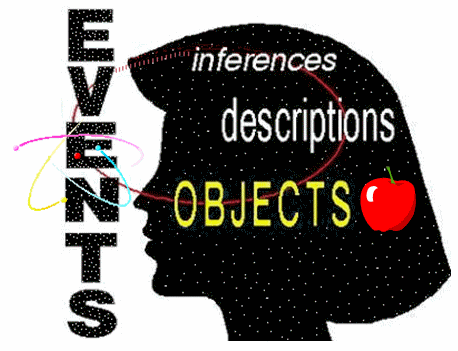
Time-Binding Ethics
Written 1996 by Steven LewisKorzybski produced his theory of time-binding before he produced general semantics. Many writers have viewed Korzybski's time-binding theory as stating merely that our growth of knowledge increases exponentially. But time-binding has far greater implications than merely a piling on of knowledge. Korzybski set out in Manhood of Humanity to dispel the notion of humans as mere brutish animals or as errant children of gods. He pointed out that human survival depends on learned reactions and their products. These learned reactions ("knowledge ...") and their products ("technologies") are handed at modest cost from one generation to the next, so that the next generation doesn't have to reinvent the wheel.
We live long and prosper today largely because we inherit virtually free-of-charge the wisdom of preceding generations. When my students complain about the cost of their textbooks I ask them to place a value on their lives. Then I asked them to consider how long it would take them, working alone or as a class, to rediscover all the knowledge summarized for them in their textbooks. Of course, they could not hope in a lifetime to rediscover all this knowledge as a class or as individuals. It took many generations of humans to produce this knowledge, which represents millions of human hours of insight and experimentation.
A couple hundred dollars for a college anatomy textbook seems in this light as a trivial price to pay for a gold-mine of information. What an incredible bargain it is when viewed from this perspective!
Likewise, a typical American farmer today can feed more than 10 times the people who were fed by a typical farmer at the beginning of the 20th century. The 1988 drought that struck the heart of the American grain belt would have meant starvation for many humans in previous centuries. In 1988 it meant only a modest rise in the prices of foods in our supermarkets.
In previous centuries cataracts meant inevitable blindness. Nothing could be done. Now those cataracts can be removed and normal vision restored without a hospital stay.
We are often reminded of the "terrible burden" we pass on to our children in the form of the "national debt" or "environmental pollution." Seldom do we realize the far-greater wealth we pass on to these same children in the form of our knowledge, technologies, problem-solving skills.
Our growing wealth of knowledge has made us more interdependent than ever, and that includes an interdependence with preceding and succeeding generations. Few Americans could hope to survive alone for very long in the hills of Montana. Korzybski's goal in pointing out this growing interdependence was to point the way to a natural ethics, which he eventually referred to simply as proper evaluation.
In Science and Sanity Korzybski developed his theory of the mechanism of time-binding, thereby giving birth to general semantics. Through training in general semantics Korzybski hoped to develop in us greater skills of "proper evaluation," which included 'ethical' evaluation as a particular case. He wrote:
"Theory and practice show that healthy, well-balanced people are naturally 'moral' and 'ethical' unless their educations have twisted their types of evaluations. In general semantics we do not 'preach' 'morality' or 'ethics' as such, but we train students in consciousness of abstracting, consciousness of the multiordinal mechanisms of evaluation, relational orientations, etc., which bring about cortico-thalamic integration, and then as a result 'morality,' 'ethics,' awareness of social responsibilities, etc. follow automatically." (S&S page xxxi)
Personally I have found that a principle discovered centuries ago by those humans interested in promoting better human relations fits in quite nicely with Korzybski's general semantics. That principle often is referred to as the golden rule or the rule of reciprocity. It has been stated many ways, including "treat others as you would wish them to treat you" and "put yourself evaluationally in the other person's shoes." The golden rule can be found at the foundation of the 'ethical' teachings of many diverse cultures, ranging from Buddhism (Dhammapada, Northern Canon, 5:18), Confucianism (Analects 12:2), Judaism (Leviticus 19:18) and Christianity (Matthew 7:12). Unfortunately, the intensional baggage that often accompanied the golden rule frequently prevented the full application of this relational principle.
If we evaluate using this extensional relational principle we will evoke a semantic pause as we consider the implications of our decisions and behaviors on others. The principle recognizes that our behaviors will set an example for others. If we want to live in a world where we can trust others to live up to their words, to respect our bodies, our properties, our human needs ... we must do the same for them.
We can view the 'golden rule' as a committment we make as a result of our understanding that our actions have effects on others, and theirs on us. If we want to create a better world -- for ourself, our 'loved ones' and others -- we need to learn to behave as social creatures, and not merely as island machines whose primary concern is calculating probabilities of what we can get away with.
The 'golden rule' is not 'innate' but must be learned, as is the more general consciousness of abstracting. Flying an airplane and cataract surgery are not innate human skills either, but many have come to realize their usefulness. In an extensional ethic a 'golden rule' serves as the only 'commandment.' Each unique situation in which we attempt to apply it gives it content. It is probably less important that our situational evaluations fully agree than that we sincerely attempt to apply extensional relational standards of evaluation to each situation.
Go to General Semantics Home Page ||| Go to Steven Lewis Home Page